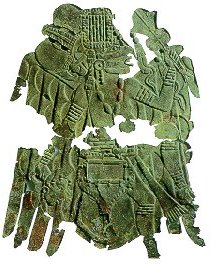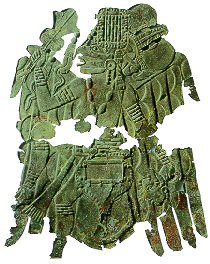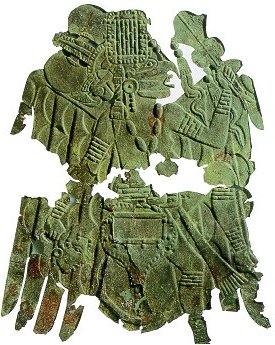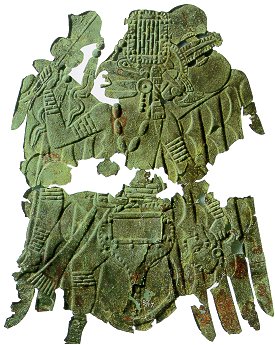Course Schedule
 |
COURSE DESCRIPTION
|
 |
This course takes a critical issues approach to the study of Native American Religions. Our approach is also multivocal, respectfully listening to all sides of the debate over the study, practice and representation of Native Religions. We will listen to viewpoints espoused by Native Spiritual Leaders, Native peoples, researchers both Native and non-Native as well as the opinions of the course participants. Among the issues we cover in this class is whether or not Native religions should be studied at all by non-participants and non-natives, how various disciplines study and represent Native religions in the past and present, whether non-Natives should participate in Native ceremonies, the missionization of Native peoples, Native Chirstianity, the Native American Church, the debate over the New Age Movement, and the history of United States federal and state laws concerning Native American religions . Each student will focus on the viewpoints of a specific contemporary tribal group in order to to discuss these issues from that group's specific historical and cultural background.
 |
COURSE GOALS AND OBJECTIVES
|
 |
Through reading a variety of articles and books by Native and non-Natives on the topics of Native Religions and critiques of the study of these religions, through open discussions of the ciritiqe of the study of Native religions themselves and the manner in which they are studies, and by writing a research/application paper in which the student integrates classroom learning with a deeper investigation of a specific topic, this course seeks to fulfill these goals:
- Students will gain a basic knowledge of Native religions and gain an appreciation for their worth and integrity.
- Students will grow in sensitivity to the issues Native peoples present about the study of Native religions.
- Students will be able to distinguish basic approaches to the study of Native religions and evaluate their merits and deficiencies.
- Students will learn the necessity of both ethical research and basic respect in the study of religion.
- Students will begin developing their own critical approach to the study of Native religions through reading, discussion and research.
- Students will be exposed to controversies both within and outside of academe and appreciate the social, political and justice issues involved in he academic study of Native religions.
 |
COURSE FORMAT
|
 |
This course uses a seminar discussion format. Students will be required to make opening statements concerning each topic to be discussed using our virutal classroom and to be conversant in the topic in general and from the history and culture of the specific tribal group the student has chosen to intensively investigate. The professor will act as a facilitator for the discussions. Groups of students will work together to summarize data, provide additional information, and to facilitate each discussion session. There will also be some interactive lecture/discussion sessions to cover background materials.
 |
COURSE TEXTS
|
 |
These required texts can be obtained through the bookstore (Black Elks Speaks is free on the internet):
Andrews, Lynn V Medicine Woman. San Francisco: Harper. 1983.
Casteneda, Carlos Teachings of Don Juan : A Yaqui Way of Knowledge. Pocket Books. 1985
Kidwell, Clara Sue, Homer Noley, George E. Tinker A Native American Theology. Orbis Books. 2001.
Neihardt, Joseph Black Elk Speaks. University of Nebraska Press Electronic Version
Sullivan, Lawrence, Editor. Native Religions and Cultures of North America: Anthropology of the Sacred. New York: Continuum. 2000.
 |
COURSE REQUIREMENTS
|
 |
- ACTIVE Class participation: You are expected to read the texts, and respond to assigned questions on the BSCW BEFORE each class. Readings and assignments are due on the date they are listed on the Course Schedule. Thus, the readings for September 14th are to be read for the class to be held on September 14th. Participation includes the following:
- speaking in class,
- adding internet sites relevant to our course of studies to the BSCW,
- using the academic resources of the college such as writing center and office hours which the professor holds,
- responding to your classmates and professor's comments on the BSCW and the Course Majordomo List
You are also expected to check the on-line Course Schedule when and if the professor negotiates any changes. Attendance, deep thought, attentiveness, and interest are all vital to your success in class but represent passive participation. Active participation is any public act that enhances the educational experience for everyone in the class. You will be asked to evaluate our own participation performance twice during the semester. It pays to examine the self-evaluation form ahead of time to see the criteria for evaluation. The professor will take your own evaluation into consideration when formulating your participation grade.
- A Term Paper: Each student will prepare a 7-10 page research paper. The paper will be an examination of some issue examined in class that goes beyond the material and discussion in class or it may be an issue not covered in the class seminars. The topic may be the investigation of a contemporary issue such as non-Indian participation in Indian ceremonies, legal issues such as the right of Native Peoples to use sacred lands, or it may be an extended study of some element of Native Religious practice.
- Exams: There is a midterm and final exam covering the material read and discussed in class. Exams will be short answers and an extended essay. Study guides will be prepared before the exam to help students focus their review. The final exam is selectively cumulative.
- Computing: You are expected to be able to use e-mail, the BSCW, the discussion list ( ant3xx@creighton.edu ), search engines and word processing to enhance your educational experience in this class. Each student is required to have an active e-mail account at Creighton. All correspondence will be sent to that account. The professor will teach the students all the electronic skills necessary for this course so a current lack of confidence in this area should not discourage a student from signing up for the course. If you wish to manipulate your account so that your mail is forwarded to another service you may use AMI ( http://ami.creighton.edu ) for this purpose.
- Regular electronic contact: You are expected to read your e-mail at least every other day and respond to the professor and the majordomo discussion list when appropriate. You are also expected to participate in our list discussion. To write a message to the list use the address: ant3xx@creighton.edu
 |
PAPER SUBMISSION
|
 |
The printed versions of your paper should be in 12 point font with and 1 inch margins on all sides of each page. A visit to the Writing Center for review of your draft will greatly improve clarity. You may also ask me to review a draft of your paper before submission provided you give me sufficient time to read the paper and meet with you personally. The Course Schedule indicates the window of opportunity when you may discuss your research with the professor and/or submit a draft of your paper for comment.
You are required to submit both a hard copy of the paper and a digital copy either on a 3.5 inch disk, by way of a file attachment, or by way of upload to the BSCW. I keep electronic versions of your papers for two reasons: 1) I link examples of outstanding papers to the course page for the rest of the class to read provided I have the permission of the authors; 2) I maintain a digital database of previous papers to ensure that there is no plagiarism in these assignments either among classmates or from year to year. If there is a suspicion of plagiarism I utilize copyfind and to susbtantiate or disprove the suspicion. On each of your papers you are requeired to provide the following information: Name, Course Number (ANT3xx), , File Type (Microstoft Word 6, Word Perfect 5.1 etc.). If you are using a MAC or Microsoft Works please save your paper in Rich Text Fromat (RTF). If you are not technologically inclined I am most willing to help you provided you come for office hours well in advance of the due date for the first paper, preferably in the first two weeks of the semester.
 |
ACADEMIC INTEGRITY
|
 |
Students are required to adhere to the requirements of integrity as outlined in the Creighton University Creighton College of Arts & Sciences Committee on Academic Policy, Discipline, and Appeals. Students are expected to interact with each other in a way which will enhance the learning experience of all and which is never destructive of other pesons. Because of the importance of acknowledged collaboration, students are required to cite all assistance, including that gained from peers. Students must never plagiarize. The professor maintains an audit policy for this course to both reward extraordinary performance and to guard against misuse of sources. Infringements of academic integrity will result in your failing the class and the incident being reported to the academic dean.
If a student is suspected of plagiarism by using internet resources inproperly or obtaining a paper from an internet source rather than research and hard work the suspected document will be submitted to TurnItIn.com. By taking this course, students agree that all required papers may be subject to submission for textual similarity review to Turnitin.com for the detection of plagiarism. All submitted papers will be included as source documents in the Turnitin.com reference database solely for the purpose of detecting plagiarism of such papers. Use of the Turnitin.com service is subject to the terms of use agreement posted on the Turnitin.com Web site. Students will be notified through the paper audit if a paper is suspect and unless the student can show proper evidence that all work is original and properly cited the professor will utilize TurnItIn.com.
 |
CLASSROOM CONDUCT
|
 |
During this class we will cover a wide variety of very controversial topics and look at some rather disturbing information. It is essential that students respect the opinion of each other in this class. It is also important that all students be granted equal voice and allow disagreement in order to advance in learning. Thus in the classroom and during electronic discussions students should respectfully address the issues and each other's stances on the issues. We must all be open to disagreement. It is also important that students discuss from the basis of a thorough understanding of the issues rather than from emotion or ill-formed opinion. Thus reading and research are essential to the discussions. Students should be both equally willing shift their own positions as well as to convince others to shift opinins as the course progresses.
 |
GRADING
|
 |
Grades are determined in the following manner:
| Participation |
25% |
| Exams |
50% |
| Term Paper |
25% |
Letter Grades are Awarded as Follows:
| A | 100 - 93 |
| B+ | 92 - 87 |
| B | 86 - 82 |
| C+ | 81 - 75 |
| C | 74 - 70 |
| D | 69 - 65 |
| F | Below 65 |
 |
ATTENDANCE AND SUBMISSIONS POLICY
|
 |
You are allowed (but not encouraged to use) up to three excused absences during the semester. If you exceed two unexcused or three excused or a combination of excused and unexcused absences that totals more than three, you will lose a half a grade for each excessive absence from your final average ( thus if your final numerial grade is the equivalent of a B you will receive a C+ for one excessive absence) unless you can demonstrated that you are in a special situation have made arrangements before time with the professor.
An excused absence is defined as an absence in which the student advises the professor by e-mail or phone before the class takes place and the student substantiates the absence through written documentation which is due within seven days of the absence.
A half letter grade will be deducted for each day an assignment is late unless there are special circumstances and the professor is notified no less than 24 hours before the assignment is due. Note that missing the class on the day which an assignment is due does not give you an extension for the assigment. You need to notify the professor why you were absent for that day and turn in your paper that day unless you have made previous arrangments or there are extenuating circumstances.
 |
SPECIAL NEEDS
|
 |
If you have any special learning needs, a documented disability, or are in circumstances which necessitate
special consideration, please
contact me within the first three weeks of the semester. Students
who believe that they have a disability that may influence their academic
performance, but who have not yet had the disability documented, should
immediately contact and meet with Denise Le Clair, Coordinator of Services for Students with Disabilities. If a student suspects a disability, he or she can meet with Linda Pappas who is the Academic Success Counselor at Creighton's Counseling and Pyschological Services.
 |
MUTUAL EXPECTATIONS
|
 |
Below are mutual expectations for this course. I invite students to amplify the list for this specific course for both expections of me and of yourselves.
You can expect me to :
-
be on time for class and office hours
-
be prepared for class
-
return tests and papers promptly with sufficient comments so you understand why you received the grade you received
-
distribute grade reports electronically so you can check the accuracy of my gradebook and know your standing in the class at any given time
-
allow students to question grades without prejudice and, when asked, re-evaluate work based on the material you initially gave me
-
be respectful and attentive when you speak
-
give prior notice of any necessary changes made in the syllabus and make additions or alterations only with the consensus of the class
-
treat you with respect, fairness and impartiality
-
tell jokes and make humorous remarks, some of which may actually be funny
-
create at least one opportunity for students to socialize with each other and the professor over a gourmet meal
I expect you to:
-
be on time for class (Note: When people arrive
late for class, they interrupt the work that has begun. If you are late,
I believe an explanation is due us immediately after class.)
-
do all assignments on time and be prepared for class by completing all the required readings and pre-discussions
-
sign up for office hours at least 24 hours before the actual appointment and be on time for the appointment.
-
be respectful and attentive when I speak and when your classmates speak
-
treat each other and me with respect consistent with the norm of academic
freedom and the Jesuit tradition's focus on the dignity that is due all
individuals
-
not leave class once it has begun unless some truly critical situation
arises (Note: If you know you must leave class before the period ends,
you should explain this to me before class; if you find that you must leave
class without prior notice, you should explain the situation to me by the next class meeting.)
-
attend class and give prior notice of illness or other events that prevent you from attending class
-
give me prior notice of important events/conditions (e.g. disabilities,
medical conditions, child and other care-providing obligations, work
schedules, etc.) in your life that may influence your performance in the
class, if you believe that these events/conditions put you at an unfair
disadvantage relative to other students and you believe that there is some
way in which I can assist you (Note: prior notice is essential. Once exams
are taken and papers turned in, my ability to assist you is extremely
limited.)
 |
GENERAL INFORMATION
|
 |
Office: Administration Building 433
Office Hours (please sign for an appointment on my door):
Monday: 9:30 - 11:00 AM
Tuesday: 7:00 - 10:00 AM
Wednesday: 2:30 - 3:30 PM
and by appointment
Phone:
OFFICE EX 3587
HOME EX 3115 (do not call after 9:00 PM)
E-mail Address: bucko@creighton.edu
E-Mail Hours:
I normally check my e-mail several times a day. I receive over 100 e-mail messages a day. Generally if you write to me you will receive a brief reply from me. I am not being dismissive of your message but expeditious in working through my mail. If you find my response inadequate, please notify me and I will respond again more fully. If your question or request is complicated, I may ask you to sign up for office hours rather than respond to you directly by e-mail. Because I encourage electronic communications, I guarantee that I will check my e-mail and respond to your questions and requests at minimum on the following days and times:
Monday 6:00 AM
Wednesday 6:00 AM
Friday 6:00 AM
 |
COURSE READING AND DISCUSSION SCHEDULE
|
 |
This is a list of topics. When the course is approved and I have more time to collect ancillary reserve readings I will complete the class by class schedule.
Computer literacy necessary for this class
Should American Indian Religions be studied by non-Indians and/or non-participants?
What is the history of the study of Native Religions and why is this history problematic?
How does one "study" Native Religions?
- Anthropological approach
- History of Religions approach
- Literary approach
- Ethnohistorical approach
- Native Approaches
- New Age Approaches
The United States Government and Native Religions
Native Religions and the New Age Movement
Archaeology and Native Religions -- Study of Human Skeletal Remains
Plastic Shamans and the Native Regulation of Religions
Native Christianity
Contemporary Traditional Movements
Please refer to the course schedule for a comprehensive listing of readings and other assignments. Note that I have yet to complete this task!


